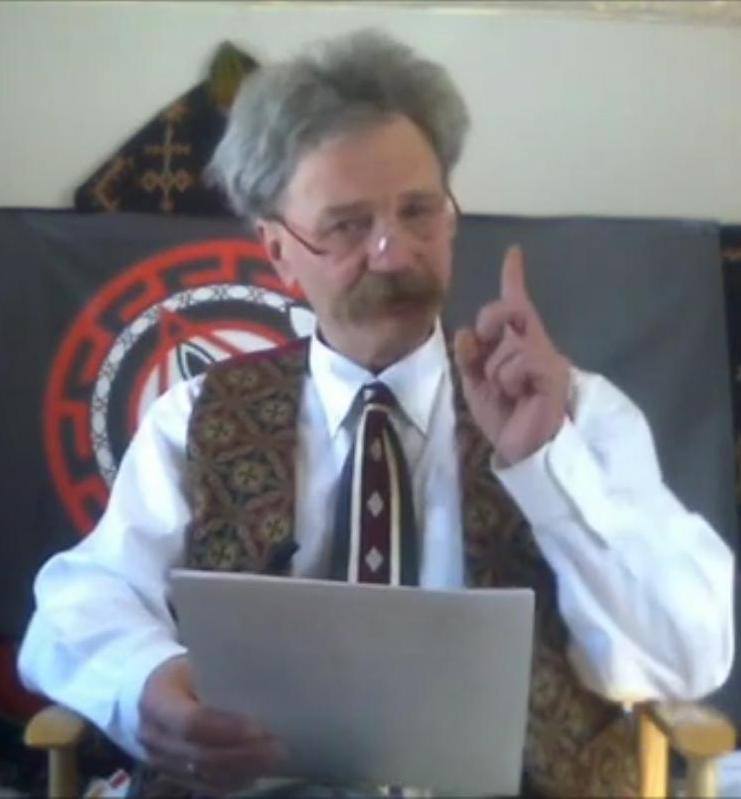Adapted and abridged from Kevin MacDonald’s foreword to the 2011 book Raciology by Vladimir Avdeyev (read MacDonald’s entire review here or here).

Philippe Rushton once commented that science moves forward, continuing to gather data and refine its theories—with one important exception. A century ago, there was a robust Darwinian science of race differences, from differences in head shape and cranial capacity, to differences in intelligence and behavioral restraint. However, this young science was nipped in the bud.
But not because it was displaced by a new, powerful, empirically-based theory. Rather, the demise of racial science came about because of intellectual movements dominated by ethnic Jews and tightly linked to the political Left—the topic of my book, The Culture of Critique: An Evolutionary Analysis of Jewish Involvement in 20th-Century Intellectual and Political Movements (Kindle edition now available).
This was a case of science being replaced by ideology—an ideology designed to oppose the idea that Europeans were in any way unique or superior. Ultimately, it was an ideology that rationalized the decline of Europeans and their culture that we see all around us today.
The new ideology decreed that humans were infinitely malleable creatures of their culture. It eventually became defined by the view that “race does not exist.” Franz Boas, the high priest of the new cult, was a strongly-identified Jew and committed Leftist. His famous study purporting to show that skull shape changed as a result of immigration from Europe to America was very effective propaganda weapon in the cause of eradicating racial science.
Indeed, it was intended as propaganda. Based on their reanalysis of Boas’s data published in the Proceedings of the National Academy of Science (pdf), physical anthropologists Corey Sparks and Richard Jantz, while not quite accusing Boas of scientific fraud, find that his data do not show any significant environmental effects on cranial form as a result of immigration. (See summaries here and here). They also claim that Boas may well have been motivated by a desire to end race-realist views in anthropology:
While Boas never stated explicitly that he had based any conclusions on anything but the data themselves, it is obvious that he had a personal agenda in the displacement of the eugenics movement in the United States. In order to do this, any differences observed between European- and U.S.-born individuals will be used to its fullest extent to prove his point.
As a result of the massive success of this Leftist onslaught, the science of race differences languished. Whatever truths it had uncovered were forgotten.
In Raciology, the Russian journalist Vladimir Avdeyev resurrects the vast tradition of research on the physical anthropology and psychology of race differences. His book is an exhaustive summary of research in the field from the 18th century to the present. It includes a great many summaries of the research of individual scientists, many of whom have been virtually forgotten.
But Raciology is far more than a compendium of research. It also vigorously defends the idea that, as Avdeyev puts it, “the problem of race is the nerve center of world history.” It is intended to influence how people think about race in the context of history and current events.
Several themes recur throughout Raciology.
Race is overwhelmingly the result of biological inheritance, not cultural programming.
Beginning with Count Joseph Arthur de Gobineau, this body of theory and research proposed that the biologically-based racial characteristics of Whites have led them to be originators of superior cultures. The White race evolved in the north of Europe and spread south and east to be the main force behind the ancient cultures of Greece, Rome, Egypt, India, Persia, and the Hittites.
The ancestral type of the White race—called the “Nordic” race originally by Joseph Egorovich Deniker—is characterized by blond hair, blue eyes, light skin, tall stature, and dolichocephalic (long-headed) skull with a well-developed prefrontal area (the area of the brain associated with intelligence, impulse control, and decision making).
Houston Stewart Chamberlain may be considered paradigmatic of a theorist who proposed that northern Europeans are a superior people.
All outstanding peoples that appeared starting in the 6th century in the role of true deciders of the fate of humanity as founders of nations and creators of new thinking and original art, were mainly of German origin. The creations of the Arabs stand out for their short duration; the Mongols only destroyed but they created nothing; the ingenious Italians of the Middle Ages were all émigrés, or of the north which was saturated with Lombard, Gothic, or Frankish blood, or they were Germano-Hellenes of the south; in Spain, the creative element was the Visigoths. The awakening of the Germans forms the foundation of European history, for their worldwide historical significance as founders of a completely new civilization and a completely new culture. [Introduction to The Foundations of the 19th Century]
Nevertheless, Avdeyev notes that, despite Chamberlain’s views on the centrality of the Germanic peoples, he advocated a union of Celtic, Germanic, and Slavic peoples in defense of the White race. Indeed, a theme of Raciology is that “the scientists of Germany well understood that the differences between the Germans and the Russians were extremely insignificant.” In fact, Avdeyev notes that Russians have a higher percentage of light hair and eyes than the European population generally.
Naturally, the idea that Whites had superior traits went along with eugenic ideas of racial betterment. In the words of German racial theorist Hans F. K. Günther, quoted by Avdeyev, the question is “whether we have enough courage to prepare a world for future generations, [by creating a race] that has purged itself in racial and eugenic terms.”
Geneticist Fritz Lenz, writing in 1934, viewed creating and maintaining a superior race as the ultimate struggle:
Undoubtedly, one may lead our race to such an ascent and flowering like it has never achieved before. But if we lose heart, our Nordic race will utterly die… Before us stands the greatest task of history.
That is, active efforts must be made to preserve the best elements and to rid the race of detrimental elements by discouraging reproduction of those who are prone to criminality, low intelligence, or psychiatric disorders. Avdeyev expresses the fundamental goal of eugenics as follows:
Our main goal is crystal-clear: the creation of a new, super-perfected White Race, the moral and physical degradation of which has reached its limit.
Compare American writer Lothrop Stoddard, writing in 1920:
The eugenic ideal is… an ever-perfecting super race. Not the “superman” of Nietzsche—that brilliant yet baleful vision of a master caste, blooming like a gorgeous but parasitic orchid on a rotting trunk of servile degradation, but a super race, cleansing itself throughout by the elimination of its defects, and raising itself throughout by the cultivation of its qualities.” [Lothrop Stoddard, Revolt against Civilization: The Menace of the Under-man; emphasis in original]
However, despite the great flowering of culture emanating from Europe, and despite the knowledge that Europeans and their culture dominated the planet, there is also a pessimism that pervades this literature—the idea that White racial elites tend to become eroded over historical time because of admixture with lesser types.
It was common among these thinkers to assert that the depletion of the Nordic racial stratum accounts for the decline of Greece, Rome, the Hindus, the Persians, and other Nordic civilizations. For example, Ludwig Woltmann:
The blonde element of the people defines its cultural worthiness, and the fall of great cultures is explained by the dying out of this element.
Eugen Fischer:
[In Greece] the death of the families of fully-vested citizens and the admission of the descendants of slaves and the aboriginal population as citizens, led… to collapse. Rome died of race mixing and the products of degeneracy.
And finally, Otto Reche, writing in 1936:
That which we call “world history” is in essence nothing more than the history of the Indo-Germans and their achievements; the powerfully rousing and simultaneously tragic song about the Nordic race and its idealism; a song which tells about how the strength of the race did what seemed impossible and reached for the stars, and how the strength quickly dried up when the “law of race” was forgotten, when the Nordic man ceased to preserve the purity of his blood and strongly mixes with races [that are] less gifted in cultural terms.
The psychological traits attributed to Nordics are principled moral behavior and idealism, high intellect, inventiveness, and, in the words of Gustav Friedrich Klemm, a proclivity to “constant progress” and science:
Members of that race most often strive for the unknown, for the sake of a pure idea, driven by the thirst of knowledge, and not self-seeking interest.
[Here MacDonald extensively summarizes his views on the handicaps of Nordic individualism before Semitic collectivism and ends his review thus:]
Raciology is a most welcome development. The anti-racial theorizing of Boas and his followers continues to overshadow the current era. Such views are in their essence political movements against European peoples masquerading as science, designed to disarm Europeans—to make them defenseless against the onslaught of other peoples and cultures.
The reality is that the racial science that thrived in America until the 1920s and in Germany until the end of WWII coincided with an era of racial and cultural confidence among Europeans. It occurred at a time when Europe dominated the planet and was spreading its people and culture to all corners of the world.
On the other hand, the assault on this body of research has coincided with an unprecedented retreat of Europeans, not only from outposts like South Africa and Rhodesia (now Zimbabwe), but even in Europe itself, which is now being overrun by non-Whites. Countries like the United States and Australia that that were at least 90% European in 1950 are undergoing demographic transitions which predict that Europeans will be a minority with a generation or two.
During this ongoing disaster of European retreat, racial science has remained undeveloped and largely forgotten. It is to be hoped that a resurgence of racial science as outlined in Raciology will be part of a general resurgence of the European peoples. It is certainly a step in the right direction.







